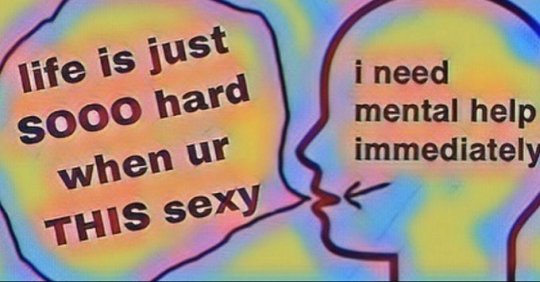Text
People don’t owe you their downtime! And I don’t mean this in a harsh way, but in a “quit breaking your own heart” way.
It’s so easy to see a friend “active” and reblogging on tumblr, or maybe making a status update on Facebook and feel hurt they haven’t replied to our messages.
Different things take different energy. And someone being “online” but not actively talking to you does not mean they no longer love or care about you.
20K notes
·
View notes
Text
"a narcissist's eyes will turn pure black" you mean like an adorable kitty cat?? an adorable kitty cat who saw a fun toy??
#i remember seeing this somewhere sjdkslj it's so ridic#my eyes turn black when i curl up on a soft blanket and am cozy and happy like a kitty
826 notes
·
View notes
Text
neurotypicals will be like "you can't self diagnose" and then diagnose everyone they dislike as a narcissist
38K notes
·
View notes
Text
narcissists talking to each other is just. throwing treats back and forth. i love it. i love my treats. i love giving someone else treats because oohohoo im being so good and nice and making ppl feel good. narcs are the best
123 notes
·
View notes
Text
Tips for Cluster B Anger
~ coming from someone who has BPD and a psychology special interest
Have you been feeling like your anger is completely uncontrollable and all encompassing? Do you feel like your anger controls you more than you control it? Me too! But here are some things I've found to be helpful:
- Taking notes. Write down triggers for what causes your anger episodes (as well as other episodes e.g sadness or paranoia) once you come down from it and start looking for a pattern. Not only will this help you to slow down and self reflect, you can begin to either avoid those triggers or find ways to regulate the effects.
- SLOW DOWN. If something is making you want to hurt someone else or yourself, slow the FUCK down. Push against the grain, step back and let yourself have a good cry or scream into a pillow. Do whatever you can to (healthily) process the emotions, no matter how long it takes, before making major decisions.
- Avoid self harm, substances or unhealthy habits like disordered eating or emotional self harm. It's so tempting, believe me, but it will only serve to make things worse. You might feel like you want it to get worse now, but in the future, you WILL regret it. If you start feeling these urges, refer to the urge surfing diagram below this.
- Get outside advice. Think you're splitting but you can't tell? Run the situation by a close friend or loved one and see how they feel about it. Try to relay it with as little bias as possible and see if they agree with the decision you're about to make or if you perhaps need to reevaluate some things.
- Take care of your heart. I know this is cliche, but a good sleep schedule, hearty food consumption habits, hydration, exercise routine and mental health care go a long way in helping you succeed in the above tips. You are struggling with an illness, and ill people need as much care as possible. Become your own parent.
This works for anger in all Cluster B personality disorders, as well as with autism spectrum disorders!
Urge surfing:
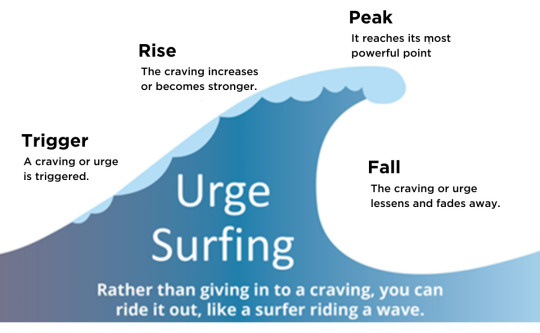
708 notes
·
View notes
Note
Feel free to ignore this, but I'm a disabled writer who tends to focus on representation in my works, and I came across your posts about having npd while doing research for a side character in a story of mine. I really appreciate you taking the time to write out a description of npd that shows the roots of the issues and the way they affect the people who have it rather than how outsiders perceive it. I just wanted to ask if there were any traits of npd that you personally would like to see in npd representation/ if you have any thoughts on how you'd like to see characters with npd represented in media? I know at current there's basically no positive npd rep, which sucks for sure, but in a hypothetical situation where there was a character with npd who wasn't villianized for it, what sort of aspects of npd would be comforting for you to see reflected in a story?
Once again, feel free to ignore this ask if I'm overstepping at all, and I hope you have a wonderful day <3
Hi!! ♡ Apologies for the late reply, I wasn't on tumblr for a few days, then my alter was out for the next couple days and I wanted to be the one to respond-
I really appreciate that you're taking the time to research and create thoughtful representation, and I'm glad my posts could offer some help with that!
My first two thoughts are:
Characters whose symptoms present differently than the common portrayal of NPD
It's super common for people to not recognize NPD because they have this very limited view of what it is and how it can present - so it would be nice to see representation that shows variety in the way it can manifest.
For example, it's actually very common for someone with the disorder to primarily "lash in" rather than "lash out", but I never see that represented (intentionally, at least).
There's also a very limited perception of narcissistic characters being blatantly arrogant, grandiose, braggy, selfish, power-hungry, etc. But really, there's an unlimited number of ways someone can present outwardly, because the only thing that's crucial to the diagnosis is the internal experience - how if affects the person who has it. How they appear outwardly to others can vary wildly.
(I'll admit, some of these "stereotypical NPD" characters feel very relatable due to shared symptoms and vibes and power fantasies. To the extent that I have one of them as my pfp on some accounts lol. But if you met me IRL, my vibes are just "confident and bubbly, polite, quiet and distant, fashion-oriented, straight A student, cutesy, braggy, adventurous", and I always make the effort to be kind to people even though I can be somewhat distant and goal-oriented.)
It's also common to think of someone "flying into a rage" when they feel criticized - but anger (whether external or internal) isn't an inherent part of it. The issue is that someone perceives criticism as a threat, so their fight/flight/freeze/fawn response kicks in, and there's a large multitude of ways that can show up.
(Personally, I go into either fight or fawn mode. But the vast majority of the anger I've felt has been entirely self-directed, manifesting in the form of self-criticism, self-hatred, self-destruction, overworking, eating disorders, etc. I will occasionally feel outwards anger, but when I do, I give myself time and space to process it by myself so that I don't upset anyone. And even for those who feel external anger much more often than I do, it doesn't mean they'll express it in an aggressive or harmful way.)
tldr; I'd love to see a variety of outwards presentations, with the NPD being shown via their internal experience, rather than only displayed through stereotypical external behaviors.
2. Humanization for characters with NPD who make mistakes
People with NPD are human just like everyone else, which means that mistakes happen. Everyone accidentally fucks up, hurts someone, lacks self-awareness in certain areas, etc.
The level and type of interpersonal struggles, and the reasons behind these struggles, are all across the board. That's understood with any other disorder (or any sort of identity), but there's so much extra baggage and stigma applied when NPD is involved for some reason.
So for characters with NPD with higher interpersonal conflict, I'd want them to be humanized in the same way that anyone else with any other identity would be humanized. And I'd also want it shown that characters who don't have NPD can have high interpersonal conflict as well, that it's not limited to this disorder.
"what sort of aspects of npd would be comforting for you to see reflected in a story?"
In terms of specific aspects-
Personally, I'd love to see a character who like... tries to be perfect. Is externally very put-together in some way - maybe they're very kind and soft-spoken and sweet, or they're silly and happy and energetic, or they're quiet and serious and protective, or calm and mysterious and self-assured, doesn't matter. But everything seems okay on the surface.
But internally, they put so much pressure on themself. They hold themself to impossible standards, and feel like they HAVE to be seen a certain way and never show weakness. They have to handle everything perfectly. Just... so many symptoms and struggles that are hurting them internally, and overtime it ends up bubbling out in small ways, or like. Tbh I'd love it if someone would just... notice.
Notice the perfect bubbly happy straight-A student who's always kind and never shares their own opinions. Notice the quiet, highly-skilled protector of the group who somehow always knows the right thing to say and the right way to act.
And give them permission to be imperfect. To be human. Show them that they aren't their reputation or their skills or how impressive they are, they're so much more than that.
They can see the pain they're in, and instead of treating them as this untouchable perfect being, they treat them in a human way.
The super bubbly character seems completely unaffected by recent tragedy? Okay. Their friend doesn't ignore that. They don't push and prod, but they don't ignore it. They sit with them, spend time with them, hold them, they know it affected them.
I'm imagining a scene where the character w/NPD fucks up somehow, and they seem fine, but someone close to them suddenly Realizes and they just. Go to find them. And they're just having a massive breakdown, but the moment they see their friend, they quickly try and shove everything under the surface and act cool and unaffected and "normal", but their friend goes over and just holds them and. Ungh. 10/10
Couple months ago I did actually see an episode of a show like that, and both times I watched it, I bawled my fuckin eyes out lol.
Different people may have different answers in terms of what they'd feel most comforted by, but for me personally, I'd love this so much, because this is how I present and I desperately want to be Seen and Loved and have someone see my self-worth as being inherent and not tied into how "perfect" I am.
Closing thoughts:
Personally, there's not much that I'd feel offended by. To be honest, in addition to characters who fit the above points (various presentations, average-level interpersonal conflict, etc.), I also write characters who have that "stereotypical" presentation. I don't think there's anything wrong with it as long as it's not done maliciously, especially if there's other types of characters shown. (Similar to having both gay villains and gay protagonists or side characters, y'know)
The only thing I'd dislike / that would hurt my feelings is like... seeing a character be heavily demonized for their traits*, or the only characters with NPD being horribly abusive, or the usage of stigmatizing language (aka, if the character is spoken about the way buzzfeed articles speak about us).
*aka, demonized for the symptoms. Totally fine if someone does something shitty and it's pointed out as being shitty / if people dislike them for that lol.
Hopefully this isn't getting too long, but to give an example of what I mean, something I saw that did hurt my feelings was like-
There was an episode of a show where a character got super braggy and confident, and was relishing in the praise and admiration she was getting. Hinging her self-worth on that recognition and success. And her friends got annoyed and pissed off, simply because she was braggy. There were a couple of things here and there she did that were kind of insensitive, but that was never really pointed out or seen as the main issue, it was only her bragging that was being demonized for some reason.
And then her friends all ganged up behind her back and did something to intentionally trigger a crash and make her feel insecure and terrible about herself, all to "knock her down a peg". And the narrative framed that as being justified, framed her friends as being correct in this situation. They never once showed concern for her mental health or the fact that she was hinging her self-worth on other people's opinions of her, they tore her down for her bragging instead of either a) supporting and uplifting her, or b) showing concern for unhealthy mindsets, and they never even tried to approach her or communicate with her about the things she was doing that actually were insensitive.
Hopefully that wasn't too much of a tangent lol, but that's the type of thing I mean by "being demonized for their traits". Hate when all a character is doing is bragging and feeling good about themself and the narrative frames them in an extremely negative light for it :(
Okay I will wrap up the post here as it's already pretty long, but hopefully this helped a bit!! Thank you for the question, and good luck with your writing! ^^
42 notes
·
View notes
Note
hey i just wanted to say, ur posts on npd and the breaking down the criteria of it (and making it fairly easier to understand) has helped me so so much to not only understand the disorder as a whole but where the roots of it coming from, how it really affects the person having it, and the presentation styles that vary from person to person. saluting emoji, also it kind of helped me come to terms that i might have npd and helped me work on it a bit more. extra dextra thankies i hopeth you get three bajillion extra bouquets thrown ur way!!!
!!!! thank you so much! 💖💖 this makes me happy to see, im so glad that i could make a difference in spreading awareness and combating stigma
i really appreciate you taking the time to read and look through the posts, and i wish you the best of luck in your healing journey <3 ^^
3 notes
·
View notes
Note
npd culture is i am never ever ever going to be good enough no matter how hard i try. never.
.
84 notes
·
View notes
Text
Narcissistic highs vs narcissistic crashes
Narc highs
When the grandiose facade is working at its best, it can produce something called a “narcissistic high” or “narc high”. Narc highs are periods of inflated self-image that are often strong enough to be felt by the person with NPD. The narcissist experiencing a high may feel especially upbeat, giddy, and entirely optimistic— sometimes to the point of our own detriment.
It is common for a narcissist in a narc high to develop manic-like symptoms such as a soaring confidence, unrealistic goals, and a “do it all— right now— no waiting” attitude. We may forego planning our actions due to feeling certain things will work in our favor, which can lead us to making risky decisions. We may also feel comfortable saying and doing things that we wouldn’t normally say or do for the same reasons.
During narc highs, we tend to feel notorious and larger than life and treat the situation as if we’re the center of attention regardless of what others in the room are doing. We may even imagine ourselves as being stronger, smarter, or prettier than what is realistic for a human being.
This is not to be intentionally self-centered or arrogant, but is a symptom of our illness changing our perception. We may not even recognize we’re having symptoms during these moments because the symptoms can impair our insight and overall awareness of ourselves and others. We might even feel like we’re not mentally ill anymore, despite that feeling being the result of mental illness.
So what should others do about our narc highs? Nothing really. If we’re not hurting ourselves or putting anyone else at risk, there’s nothing that needs to be done. We only suffer from narc highs if our behavior hurts us. Otherwise, we’re feeling great. Just let us ride the high for as long as it lasts. In the event that you need a break from us, please do not cut us off bluntly. We may view it as a personal attack and begin crashing. It’s better if you give us a gentle “hey buddy, not right now” and explain why so we’re not left going down the “They hate me. What did I do wrong? X, Y, Z” spiral.
Narc crashes
“Narcissistic crashes” or “narc crashes” are the periods in which our vulnerable selves are exposed. Think of them as the complete opposite of a narcissistic high. During a crash, we’re having to face a variety of wounds we’ve put away, never having the chance to learn how to cope with them. Because of this, we lack the skills to ever handle these wounds on our own. Being made aware of our vulnerable self without proper support from others can feel like another bleeding wound in itself that we’re constantly trying to avoid and defend against.
Narc crashes can feel like so many things. I’ve heard it described as a knife to the chest, having your heart torn out, being repeatedly kicked so hard in the gut that you can’t breathe— all of those are pretty accurate to describing what it’s like being forced to deal with a grief, shame, and anger you’re unequipped to handle.
The pain of a narc crash is simultaneously terrifying and infuriating to us, which is why we have urges— to become hostile since we don’t know how else to express the degree of our pain, or to manipulate in order to gain what we desperately need to feel better.
As children, we don’t have the emotional capacity to regulate these feelings and are more likely to act upon them.
As we get older, we learn how to deal with narc crashes in less destructive ways. Many of us learn to write using the strongest words in our vocabulary. Others have found people who they can rely on for the attention and validation required to tip them out of a crash and back to grandiosity. Some of us may still choose violence, but direct our anger toward a designated object (throwing a certain rock at a certain wall or having something as a punching bag) instead of destroying property and getting into fights.
One of the ways I’ve learned to deal with narc crashes is by learning to express my emotions as what they actually are. I’ll admit I was a violent child, but it wasn’t all anger. That was just what I would act upon. I realized that I was ashamed of showing how I really felt, because I allowed others to drill in the idea that the hurt I felt made me weak. Once I taught myself it was okay to cry, I did that a lot more and lashed out a lot less. And honestly, it feels so much better to cry until you’re breathing stops than it does to punch a wall until your hands bleed. Getting the right catharsis changed a lot.
Make it your next goal to unlearn your views on crying. It’s not a sign of weakness. It’s a sign of healing. And please take care of yourself. Until next time. 💜
#<3#unlearning the thing about seeing crying/negative emotions/vulnerability as ''weakness'' is so so important#rly does help with much better processing and coping#i used to cope with crashes through intense self-destructive stuff and huge drops in motivation and overworking and isolation#but i've been coping a lot better lately#god i remember being in a major high. and completely 100% believing without a doubt that i was no longer mentally ill#and then i felt criticized on something very important to me and i sobbed for literal hours and went into a spiral after that#and i was still just like nope!! no mental illness here im all better!! it's just mood swings haha i'll be fine again in a day or two :))
595 notes
·
View notes
Text
I've been having a very good week!!
Realizing that my NPD is built around shielding vulnerability has been... super useful. Working on that has been difficult, but things have been better and better.
I've been terrified to feel and connect, terrified of getting hurt again, but I'm learning that being closed off all the time is actually a far worse pain.
So much has been opening up for me lately because of my willingness to engage in my feelings and be open. I've been trying to do that for a long time but had no idea how, but.... lately it's been working. Maybe sometime I'll make a structured post about it.
Among the many good things that have been happening this week, I've been processing stuff differently.
Like.
When I notice something criticizable in someone else, instead of feeling "superior" (read: assured that I'm doing things "right") or anxious on their behalf, I've been like.... feeling a sense of relief. Like. They're showing this "flaw". This means I, myself, can relax a little too.
When a friend asked if I was doing okay or if I wanted to talk (abt a hard time I was having), I didn't feel like it was a veiled threat or a test. I was internally just like. I don't feel comfortable opening up about this right now, but I really appreciate her reaching out, this is a sign of affection and care.
16 notes
·
View notes
Text
usually when i'm presenting in a way that i feel "doesn't represent me" or "isn't me" (e.g., just throwing on clothes, unbrushed hair, etc) I feel shame and am internally very defensive about it. mentally insisting to imaginary onlookers that "this isn't me" and giving the reasons why i look like that in that moment. and i don't feel like myself either, i feel uncomfortable and ashamed and depressed.
but earlier today, i noticed that.... i still felt like myself? i was having a really vulnerable few hours (and was doing my best to cultivate that, and allow myself that vulnerability, which i've been trying to practice a lot). and i was curled up on the couch, and i just. realized that, even though the clothes i'm wearing aren't "my style", i still felt like myself. like i'm myself in whatever clothes i'm wearing, in whatever state i'm in.
i just... thought that was a nice moment, a sign of healing.
i think it's because like.
normally, i don't let myself be fully vulnerable, around anyone or even myself. and the only way to try and communicate who i am and what i need to others is through outwards presentations. but allowing that vulnerability and honesty means that it doesn't matter, i'm me no matter what i look like or how i present.
8 notes
·
View notes
Text
Here’s a reminder to those who deal with chronic pain.
You are allowed to be upset you’re in pain. You’re allowed to have feelings about it. Even if it’s a “good day”. Even if it “could be worse.”
This is your reminder that most people don’t experience pain constantly. They aren’t just “low” on the pain scale. A lot of them are at zero.
Your pain is valid, even if you’re grading it “low” on the number scale today.
2K notes
·
View notes
Text


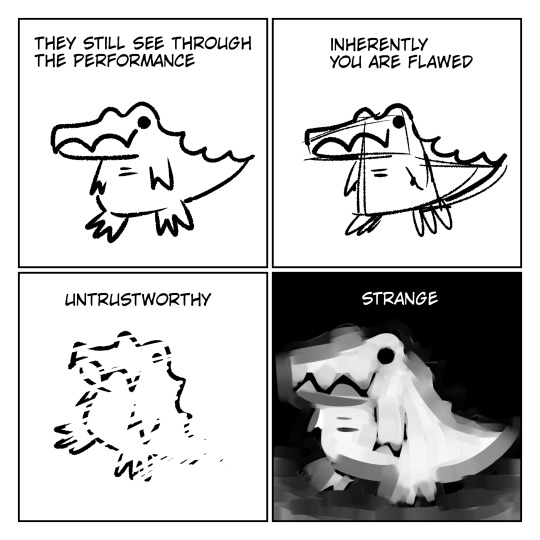
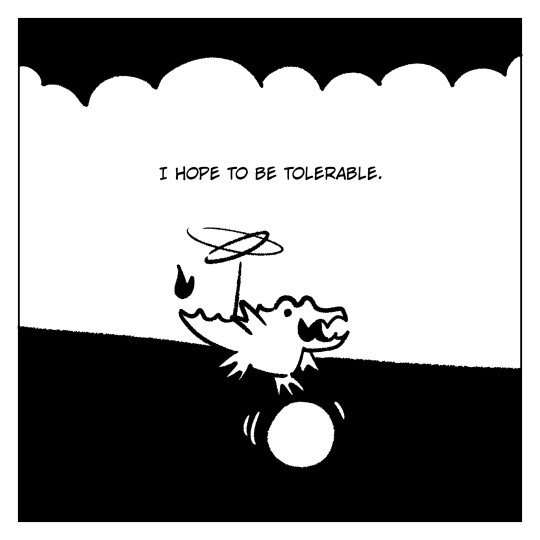
"BURDEN"
1 2 3 4
10K notes
·
View notes
Text
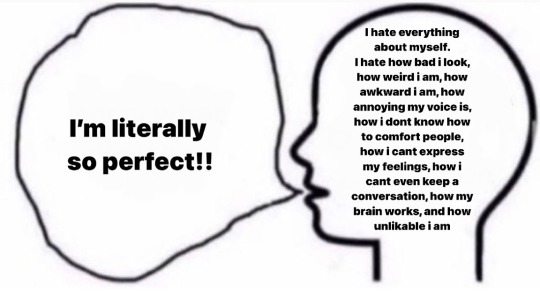
If I’m not drop-dead gorgeous then I’m nothing
𖤐
948 notes
·
View notes

